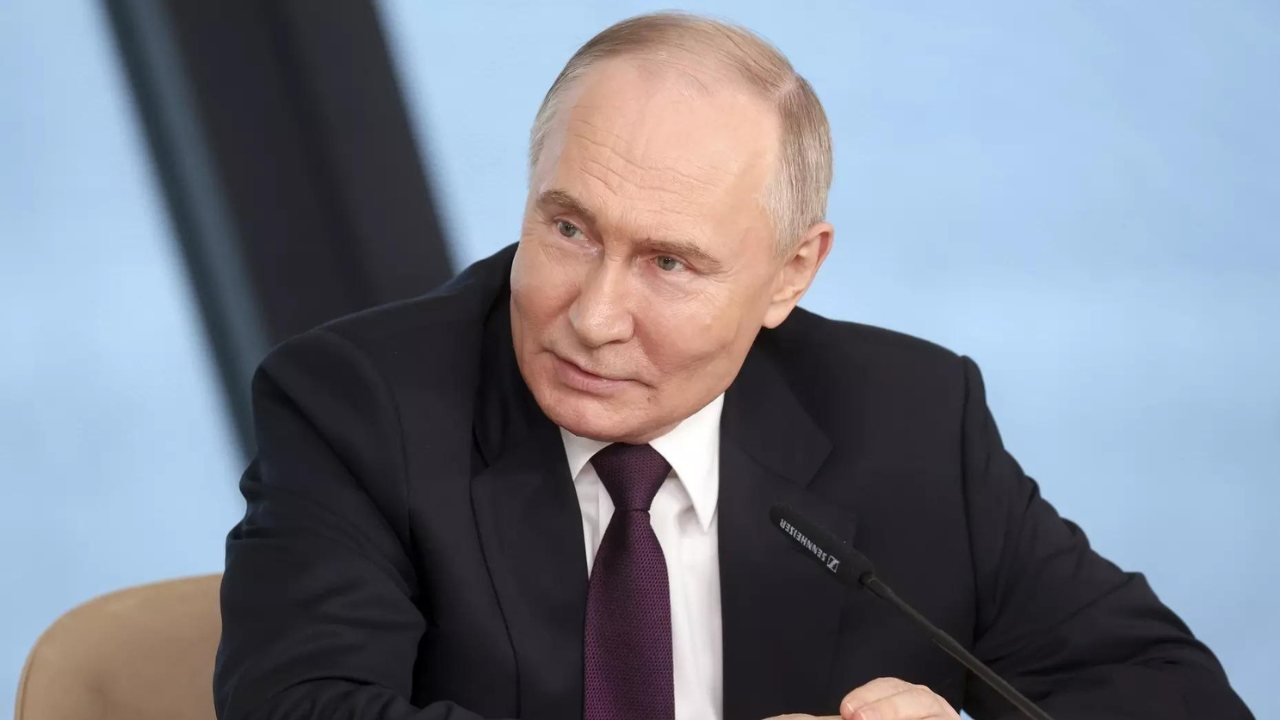[ad_1]
Russian President Vladimir Putin has issued a stark warning to countries assisting Ukraine, signaling severe consequences for those who continue to support Kyiv in its ongoing conflict with Moscow. In a public address on Friday, Putin cautioned, “Anyone who tries to intervene in the Ukraine war will be met with ‘lightning-fast’ retaliation.” This statement underscores the escalating tensions in the region as international support for Ukraine remains strong.
Speaking from the Kremlin, Putin emphasized Russia‘s readiness to respond decisively to any foreign involvement. “We have all the instruments for this, ones that no one can boast of now,” he stated. “We will use them if we have to. I want everyone to know that.” The Russian leader’s remarks were broadcast during a meeting with lawmakers in St. Petersburg, reflecting his unwavering stance on the Ukraine conflict.
Putin’s comments come as Ukraine continues to receive significant military and economic aid from Western nations, particularly the United States and European Union countries. This support has been crucial for Ukraine’s defense efforts against the Russian invasion, which began in February 2022. Despite international sanctions and diplomatic efforts to resolve the conflict, Russia’s military actions have persisted, leading to widespread devastation and loss of life.
The Russian president’s address included a veiled reference to Russia’s nuclear capabilities, although he did not explicitly mention nuclear weapons. The warning aligns with previous threats made by Russian officials, who have suggested that any significant interference could escalate to a nuclear confrontation.
In response to Putin’s warning, NATO and allied countries have reiterated their commitment to supporting Ukraine. NATO Secretary-General Jens Stoltenberg stated, “Our support for Ukraine remains steadfast. We will not be deterred by threats, and we continue to stand united in defense of Ukraine’s sovereignty.”
The international community remains divided on how best to address the conflict. While Western nations continue to supply arms and humanitarian aid to Ukraine, Russia has condemned these actions as provocations and escalations. Putin’s recent rhetoric suggests that any further support for Ukraine could trigger a severe and unpredictable reaction from Russia.
The conflict in Ukraine has drawn global attention, with numerous calls for peace negotiations and ceasefires. However, diplomatic efforts have so far failed to produce a lasting resolution. The war has caused a significant humanitarian crisis, displacing millions and creating widespread instability in the region.
As the situation continues to evolve, the risk of further escalation looms large. Analysts warn that Putin’s latest comments could signal a new phase in the conflict, with potentially far-reaching implications for global security.
“We are at a critical juncture,” said military analyst Pavel Felgenhauer. “The stakes are incredibly high, and any misstep could lead to a wider confrontation.”
With tensions running high, the international community is watching closely for any signs of escalation or attempts at de-escalation. Putin’s warning serves as a reminder of the volatile nature of the conflict and the challenges ahead in finding a path to peace.
Speaking from the Kremlin, Putin emphasized Russia‘s readiness to respond decisively to any foreign involvement. “We have all the instruments for this, ones that no one can boast of now,” he stated. “We will use them if we have to. I want everyone to know that.” The Russian leader’s remarks were broadcast during a meeting with lawmakers in St. Petersburg, reflecting his unwavering stance on the Ukraine conflict.
Putin’s comments come as Ukraine continues to receive significant military and economic aid from Western nations, particularly the United States and European Union countries. This support has been crucial for Ukraine’s defense efforts against the Russian invasion, which began in February 2022. Despite international sanctions and diplomatic efforts to resolve the conflict, Russia’s military actions have persisted, leading to widespread devastation and loss of life.
The Russian president’s address included a veiled reference to Russia’s nuclear capabilities, although he did not explicitly mention nuclear weapons. The warning aligns with previous threats made by Russian officials, who have suggested that any significant interference could escalate to a nuclear confrontation.
In response to Putin’s warning, NATO and allied countries have reiterated their commitment to supporting Ukraine. NATO Secretary-General Jens Stoltenberg stated, “Our support for Ukraine remains steadfast. We will not be deterred by threats, and we continue to stand united in defense of Ukraine’s sovereignty.”
The international community remains divided on how best to address the conflict. While Western nations continue to supply arms and humanitarian aid to Ukraine, Russia has condemned these actions as provocations and escalations. Putin’s recent rhetoric suggests that any further support for Ukraine could trigger a severe and unpredictable reaction from Russia.
The conflict in Ukraine has drawn global attention, with numerous calls for peace negotiations and ceasefires. However, diplomatic efforts have so far failed to produce a lasting resolution. The war has caused a significant humanitarian crisis, displacing millions and creating widespread instability in the region.
As the situation continues to evolve, the risk of further escalation looms large. Analysts warn that Putin’s latest comments could signal a new phase in the conflict, with potentially far-reaching implications for global security.
“We are at a critical juncture,” said military analyst Pavel Felgenhauer. “The stakes are incredibly high, and any misstep could lead to a wider confrontation.”
With tensions running high, the international community is watching closely for any signs of escalation or attempts at de-escalation. Putin’s warning serves as a reminder of the volatile nature of the conflict and the challenges ahead in finding a path to peace.
[ad_2]
Source link



